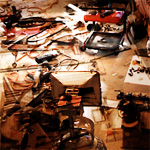 My office used to be a place where I would hide in fear as the besuited folk plowed their cubicle crops. But now my office resembles the aftermath of a freak industrial accident, and as I lay draped over my designer chair my superiors fall over themselves to praise my good work. It’s no accident that papers are strewn across every available horizontal surface, or that my desk is festooned with dozens of writing instruments, redundant office appliances, and stray pieces from things that I didn’t know what they were to begin with. The fact is that the cleanliness of my office is inversely proportional to my standing at the company, and right now I’m a superstar.
My office used to be a place where I would hide in fear as the besuited folk plowed their cubicle crops. But now my office resembles the aftermath of a freak industrial accident, and as I lay draped over my designer chair my superiors fall over themselves to praise my good work. It’s no accident that papers are strewn across every available horizontal surface, or that my desk is festooned with dozens of writing instruments, redundant office appliances, and stray pieces from things that I didn’t know what they were to begin with. The fact is that the cleanliness of my office is inversely proportional to my standing at the company, and right now I’m a superstar.
My projects are delivered ahead of time, and I take care to innovate in ways that the unexceptional minds of project managers could never anticipate. As a result of this a rather curious dynamic has become manifest: my impeccable output has rendered me untouchable.
Do my high standards stem from the desire to gain the appreciation of my colleagues? Certainly not. It’s an infallible principle that I’ve simply taken advantage of: The better appreciated the worker, the weaker the requirement for the artificial façade of personal fastidiousness. I leave management with no options. Make yourself likable and people will miss you when you’re laid off. Make yourself essential and you can lay ruin to your workspace with nary a concern.
When I started here three years ago I would always leave my environment in immaculate condition. In fact, I left no personal effects in sight for the first year, and newer employees kept taking my monitor because they thought my office had been abandoned. It was after my first successful campaign that things began to change for the better. I was given accolades by the managerial layer immediately over me, but I’m like middle manager crack: the first taste is free.
As I made myself a necessity the state of my office took a downward turn. So numerous were the post-its affixed to my appliances that they came to resemble a garden of little sunflowers. I began tiling my desks with project request forms, taking care not to let any corners overlap. And so on. You get the picture. By the time the second year rolled around I was fraternizing with board members after hours, and their spouses had me on speed dial. And, playing Dorian Gray’s portrait to my well-established success, my office lay in a befouled state unseen outside of an orangutan cage in some third world country’s dilapidated zoo.
As I moved to rendering my diagrams directly onto the conference room floors and walls, you could hear a pin drop. You don’t question genius. What were my superiors to do? As long as I kept delivering top notch product, they opted wisely to choose other battles. It’s a simple matter of ecological sustainability. You want your SUV, you’re going to have to turn away from the black plumes in the desert. Nothing new there. The only problem is that you get yourself into a corner. The day will come when I miss my numbers, and then I will be without recourse. People will turn on me: “Of course he couldn’t forecast–just look at his office. Guy’s a nut job. Always was.”
And it’s true. But it’s far less work to impress people than to clean up after myself, so who’s the genius?